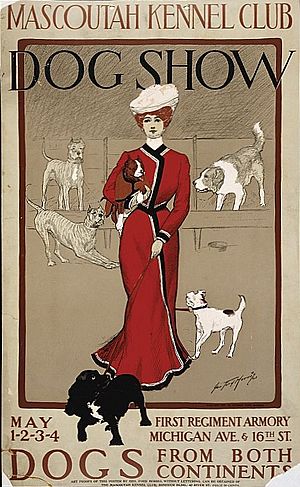Kennel club facts for kids
A kennel club is an organization that helps manage everything about dogs, especially purebred dogs. In some places, they are called a kennel council or canine council. These clubs focus on things like breeding dogs, showing them in competitions, and promoting different dog breeds.
Kennel clubs became very popular in the mid-1800s. Some are called 'all-breed clubs' because they deal with many different purebred dog breeds. However, "all" usually means only the breeds they officially recognize. These clubs focus on purebred dogs, not mixed-breed dogs or hybrids. If a club only works with one specific breed, it's called a breed club.
What Do Kennel Clubs Do?
Kennel clubs have several important jobs related to dogs. They help keep track of dog families and their history, which is called a pedigree. They also set the rules for dog shows, where dogs compete to see which one best matches its breed's ideal look.
These clubs also create and maintain "breed standards." A breed standard is like a detailed description of what a perfect dog of a certain breed should look like and act like. Kennel clubs also register dogs, meaning they keep official lists of purebred adult dogs and their puppies. They make sure these dogs come from purebred parents.
Today, some kennel clubs focus on working dogs, which are dogs trained for specific tasks. Others specialize in conformation show dogs, which are judged on their appearance. Recently, clubs for mixed-breed dogs have also started to grow. But the main purpose of most kennel clubs is still about purebred dogs. Big kennel clubs like The Kennel Club (in the UK), the American Kennel Club, the United Kennel Club, and the Canadian Kennel Club offer dog training, events, and registration services.
How Kennel Clubs Started
By the mid-1800s, many wealthy people in Europe owned dogs that had been specially bred for certain traits. Dog shows started to become popular, but they were a bit disorganized.
The first dog show in England happened in 1859. It was a social event where English noble families raised money for charity. These shows became more and more popular over the next 14 years, but they were often put together without much planning.
In 1859, the first official dog show society was formed in Birmingham, England. Just three years later, a group in Paris, France, held the first dog show on the European continent. It showed many different breeds, but there wasn't a clear definition of what made a "breed" yet.
To bring order to dog shows, a Member of Parliament named Sewallis Shirley gathered a group of dog lovers. This led to the creation of The Kennel Club in England. In April 1873, a small meeting took place, and later that year, the Kennel Club held its first show at The Crystal Palace. It had 975 dogs!
The first big meeting of The Kennel Club happened in Birmingham in December 1874. One of their first important actions was to publish a "stud book." This book listed the pedigrees of over 4,000 dogs that had won prizes at shows in the previous 14 years. They also created rules and ways to classify dogs.
After this, other countries started their own kennel clubs:
- In 1881, the French Société Centrale Canine was founded.
- In 1882, the Italian Ente Nazionale della Cinofilia Italiana (ENCI) was formed.
- In 1884, the American Kennel Club was established.
- The United Kennel Club started in 1898.
- In 1911, the Fédération Cynologique Internationale (FCI) was created. This group brought together canine societies from Austria, Belgium, the Netherlands, France, and Germany.
These new kennel club rules made sure that dog pedigrees were officially registered with their clubs. Kennel clubs helped make dog showing a popular and respected sport. They also made it possible for people to get official pedigrees for their dogs. Kennel clubs have played a huge role in how different dog breeds have developed over time.
International Kennel Clubs
Most countries that have active dog breeders and dog show fans also have their own national kennel clubs. These clubs often work together with clubs in other countries. This means that if a dog is registered in one country, it can usually be re-registered in another country if it moves there.
The Fédération Cynologique Internationale (FCI) is a very large international kennel club. It represents over 80 countries and works closely with many major national kennel clubs around the world. They often have agreements that help dogs registered in one member country be recognized in another.
See also
- Conformation show
- Kennel
- List of kennel clubs
- Dogs portal
 In Spanish: Kennel Club para niños
In Spanish: Kennel Club para niños
 | William M. Jackson |
 | Juan E. Gilbert |
 | Neil deGrasse Tyson |


